A Traveler's Guide to the End of the World
Air Date: Week of December 8, 2023
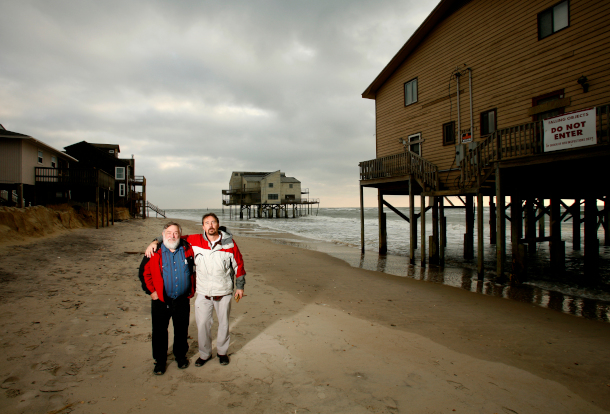
David Gessner and Orrin Pilkey traveled up and down the coast discussing the impacts of the climate crisis on the coastline. (Photo: Coke Whitworth)
1.2 degrees Celsius of global warming is already bringing dangerous climate impacts, and even if the world’s nations come together to keep temperatures from rising beyond 1.5 degrees, we face a troubling and uncertain future. Writer David Gessner tries to grapple with this in his 2023 book, A Traveler’s Guide to the End of the World: Tales of Fire, Wind, and Water, and he joins Host Jenni Doering to discuss a complicated relationship with hope amid a warming world.
Transcript
DOERING: Earth is already 1.2 degrees Celsius warmer, and without more substantial plans to curb emissions, could soon blow past the 1.5 degree target into an even more perilous world. That’s the scary and uncertain future that writer David Gessner tries to grapple with in his 2023 book, A Traveler’s Guide to the End of the World: Tales of Fire, Wind, and Water. He teaches at University of North Carolina, Wilmington. Hi David, welcome back to Living on Earth!
GESSNER: Thank you. It's great to be back.
DOERING: So the title of your book, A Traveler's Guide to the End of the World, what does the end of the world really mean to you?
GESSNER: First, I should say, I wrote it with a little bit of a wink. Because, you know, years ago, I wrote a book called, "My Green Manifesto." And in it, I said, I'm against all these apocalyptic titles, you know, the doom of the end of, so I said, I'm never going to do that. So of course, I turned around and did it. And, for me, the end of the world, you know, as many people have pointed out, the world will, in all likelihood, carry on different forms. But for me, it is the world that we're starting to see now, an erratic world and a world of species deprivation. A world where it's 80 degrees out in November in North Carolina and where we're still waiting on the potential late season hurricane. The end of the world that we used to know is what the end of the world looks like to me.
DOERING: And tell me about the premise that you set out with to really contemplate what the world might look like, in 42 years, when your daughter is the age that you were when writing this book. Why is that a useful lens?
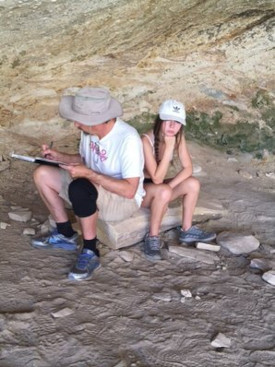
David Gessner was inspired to write The Traveler’s Guide to the End of the World in part by asking himself what the world would be like when his daughter, Hadley, was his age — in 42 years. (Photo: Nina de Gramont)
GESSNER: Well, the book grew from two things. One was accidental, and one was purposeful. And the accidental one was a year after the pandemic, I started traveling again. But everywhere I went, I saw this kind of climate world where we are in the future. So finally, by about the third or fourth thing like that, I was like, I guess this is the book I'm going to write. Simultaneously, my daughter was 18. She seemed to have the activism gene that I lacked and had been running the Sunrise program at her, you know, high school. And so I really started to wonder and try to feel what it would be like when she was my age, which was like 2062, and try to imagine the world that I'm in now is chaotic enough, like try to imagine ahead. And that was the second driver for the book. And I started to ask scientists, wherever I traveled, that question, "Describe for me, the world that we're going to have then." It was kind of like a creative writing project for scientists or an assignment for scientists.
DOERING: Well, and it also seems to speak to this concern, and I think maybe curiosity, that you have about a world that you probably won't be around to see.
GESSNER: Yeah, yeah, exactly. My daughter's name is Hadley, and she's 20 now, and she's at NYU in the Tisch School making movies, which is great. But when people said to me, it hasn't changed or kind of dismissive of this, I bring up her high school years as Exhibit A. Freshman year of high school for her, hurricane Florence hit, we evacuated for a month. And she came back home, and her school was a shelter. Spring term freshman year was her one good term. The next year, Hurricane Dorian hit and we evacuated again. And then, of course, COVID shut things down that spring. And when they did come back, it was punctuated by the occasional school shooting warning. And I was like, "Holy crap, this is a, this is a different world that I grew up in." And you know, really trying to do the work, which is hard to do, even with your own kid, of empathizing and imagining the things that she's going through, not just with this uncertainty, but with the ignoring of the uncertainty. Because that's what you know, when we talk about, we can talk about doomism a little bit, but there are plenty of kids who are just like, "We're screwed, and therefore, we're not going to think about it and carry on with our lives as if it isn't going to happen." So that's an interesting part of it, too. I think.
DOERING: Some of the scenes in this book take place with the geologist, Orrin Pilkey. Can you tell me about what that was like?
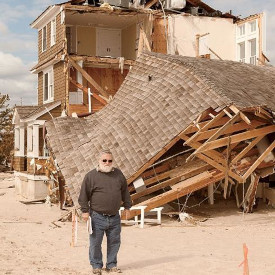
Orrin Pilkey predicts that it will become less viable to build housing along the coast as rising sea levels and increasing hurricanes hit the shores. (Photo: Jeremy Lange)
GESSNER: Well, we moved from Massachusetts to North Carolina in 2003. And my daughter was three months old when we got there. And we were only there a month when Hurricane Isabel hit. So suddenly, I was in this kind of hurricane bullseye. And being a curious person, I wanted to find out more about what living there meant. And I reached out to Orrin Pilkey, who was a coastal geologist at Duke, and he's kind of famously controversial figure down here. He's told people they should move off the beach. Water was coming in and the water was rising, and the beach was eroding, and that it was foolish to build there. And of course, that's the last thing you know, people want to hear. He would go into the science of it the way building these huge houses was like drawing a false line in the sand. And then supporting them with revetments and jetties was even worse because the erosion would occur right up into the land and make it even more dangerous once the wall was broached. So I started traveling the Outer Banks with him and having him teach me about what I was seeing. And ultimately, we headed up after Hurricane Sandy to do kind of a post mortem on the whole coast where Sandy had hit, including the Jersey Shore and going into New York City, where he would point to the subways and, you know, talk about how they became waterfalls during the hurricanes. And so it was a it was an education. And it was an early apocalyptic episode in my, in my climate education.
DOERING: One of the things about being human in this changing world is that we're human. We're living our lives. We're falling in love. We're making each other laugh and creating beautiful art all at the same time, that the world is falling apart. How do you make sense of this paradox?
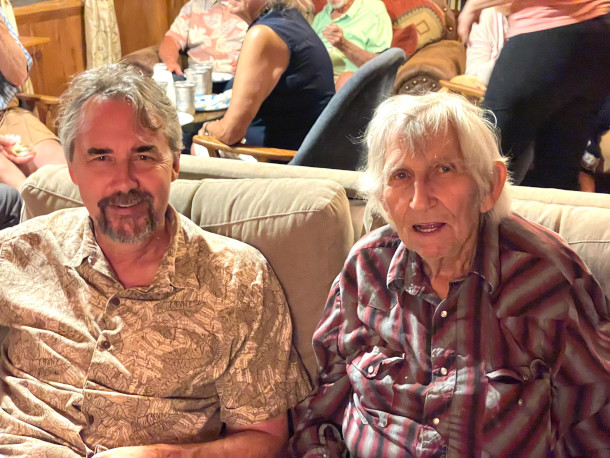
Ken Sleight lost a life’s worth of research when his shop burned by a wildfire, and was then flooded, in 2021. (Photo: ML Lincoln)
GESSNER: I'm really glad you asked that question. And not not too many people have. To me, that's really kind of the crux of the book in a way. In the book, I say, I'm tired of the word hope. I want to check out the word hope. In my life, I rely on hope as a fuel to go from day to day. So there's a contradiction there. But for me, I think that interesting psychology of climate change is the way we've repressed this thing. But I understand why we've repressed it. I mean, we don't walk around all day thinking about our death or our doom. And like you said, with falling in love, we're kind of dealing with our career. We're dealing with today's problems, our things-to-do list. So for me, the interesting part was kind of exploring what that means. And still caring about climate and making a book about it was, in one way, a very practical way for me to think more about climate.
DOERING: We have to talk about climate anxiety because it's something that a lot of us deal with. And maybe most of the time we are repressing what's actually going on with the planet. But then we're confronted with news, like how much ice is melting in Antarctica, and the hurricane that's at your doorstep that you know, forces you to relocate for a month. How do you personally try to grapple with that in your own life?
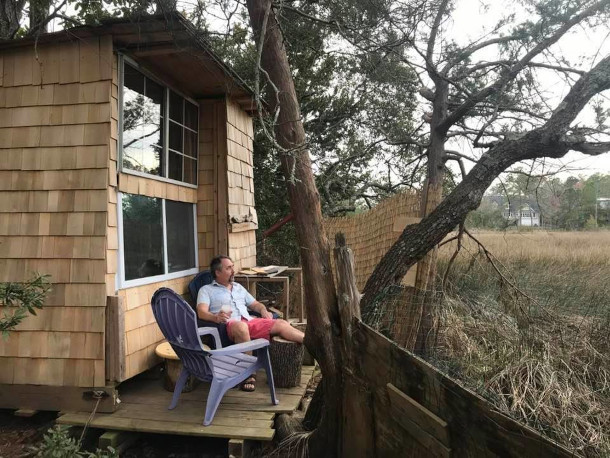
David Gessner spends most of his time writing in his shack. (Photo: Chip Hemingway)
GESSNER: Well, you know, as a writer, you know, years ago, I wrote a book called Sick Of Nature. And I now think that every other book should be called Sick of the Last Book because you obsess for two or three years, and then you turn your back on it. Like last time I was here, I spoke about Teddy Roosevelt. And I haven't done a lot of thinking about Teddy, since. It's almost being like, obsessive, and then switching to the new obsession. And so I will turn away, you know, toward the next subject, at least. The next generation and the generation after aren't going to be quite as lucky. I have a chapter in the book called "Beneath the Ice." And in it, I try to weave three things. It's kind of a triptych. And one of them is exactly what you were talking about the melting of the ice caps. You know, we read that in the news, oh, a chunk, the size of Los Angeles just broke off. And then we kind of go home, on with our things-to-do list. So that's one thread. The other is a trip I did, following the Colorado River to the source and I flew over it, I swam in it, I walked beside it, and finally hiked up to the source where the water flows below the ice. But the third thread was about my mom and her Parkinson's, and being a caretaker for a long time, you know, for half a dozen years, and how it had made me unable to remember my mother before, and unable to have an emotional connection to this person who I, you know, loved above all others when I was young, and who was a great mom, but had become something else. And there was a moment where I listened to "Annie's Song" by John Denver. And all of a sudden something cracks in me, and I'm bawling and having an old school catharsis and it's all throbbing and coming out. And to me, the climate thing is similar. Whether we know it or not, at some deeper level, it's there. And so I guess the question would be, how do we access that enough to care and to act and yet not let it swamp us and overwhelm us with the emotion. And I think that Hadley's generation, you know, that's a lot of it. I have sympathy with people who just go, "I'm turning the other way. I'm putting those blinders on." But I do think something emotional can be gained by turning toward it sometime, particularly for us oldsters who tend to just, you know, go, "Oh, it's not going to be here when we're, you know, we're going to be gone anyway," which is ridiculous. These are our kids. We're supposed to care about them more than ourselves.
DOERING: Now, as with your previous work, David, I honestly laughed out loud at times while reading this, in spite of the fact that it's about the climate crisis. You share being hungover and even trying shrooms and also getting COVID. And I felt throughout that I was getting to really getting to know you. Is that inherent to your writing style or an intentional choice when writing this book in particular?
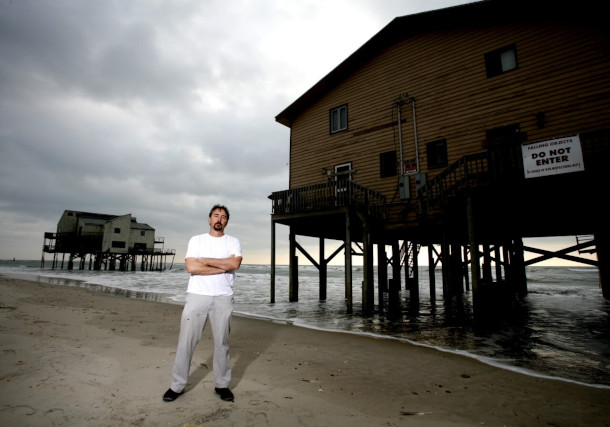
David Gessner is familiar with life on the coast: He lives in hurricane-ridden North Carolina. (Photo: Coke Whitworth)
GESSNER: Yeah I think it is. I mean, in the first page, I say, despite this tour of doom, I'm gonna give you, hopefully, we're gonna have a little fun along the way. You know, I've read writers, like, he's not in favor anymore, but I read writers like Philip Roth and Vonnegut when I was young, and, and, you know, tried to write funny, so that was part of it. But there's another type of writing that I love, which, you know, starts famously with Montaigne and, you know, the 16th century. And it's personal writing where you get the flavor of the narrator, and this autobiographical mode can be helpful, in that I think it humanizes this issue that feels so much like an issue, you know, and it's so treated in one way, so often. I'll say one more thing about the personal thread. This has kind of evolved over time with my work, you know, it was a lot more private, when I started. And it's become more public. I guess, a big moment change for me was going down during the BP oil spill. And everybody warned me and said, people don't want to talk. You know, they're, they're being private, and they're not gonna want to talk about it. Totally the opposite. Everybody wanted to talk. You know, fishermen wanted to talk. People cleaning the beaches wanted to talk. So. So this became a big part of my writing. And it got to the point where I thought the aesthetic of my writing was "a man walks into a bar." I literally did that in Vernal, Utah, when I was writing about all-terrain vehicles and off-road vehicles. I went there to do an article for an environmental magazine. And I got to town, looked around, and there was this bar. And I walked into it, and just started talking to people. And the next morning, I woke up kind of groggy. And I realized I'd made a date to go off road motorcycling with the guy I had met the night before. So I went out. And you know, I rode a motorcycle a couple times when I was a teenager, but I'd never really done it before. And off we went. I wore this kind of shoulder pads and gloves and everything and, and about halfway through, I went flying off one of the red rocks and landed and bruised my ribs and my wrist.
DOERING: Oh.
GESSNER: And I was lying on the ground. And I thought, "this is going to be so perfect for the article."
DOERING: Your relationship with hope is complicated to say the least. What role do you think hope plays in approaching the climate crisis?
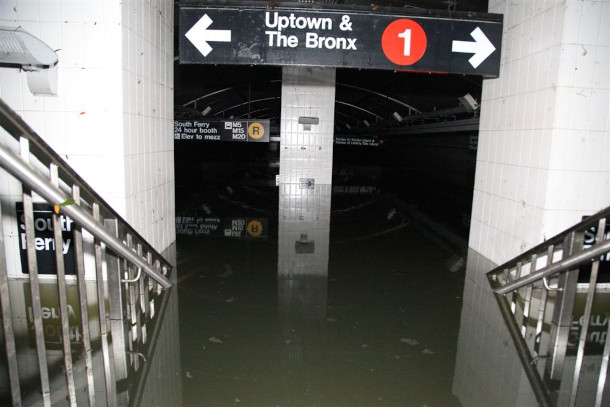
Hurricane Sandy flooded New York City’s subway stations. (Photos: Leonard Wiggins, MTA New York City Transit, CC BY 2.0)
GESSNER: Part of my criticism of hope is my criticism of the cliches of the genre, the tropes of the genre. And it seems that part of the rule is to go hard about the dire state we're in and then give a little glimpse of green and uplift at the end. And you see that most comically in news broadcasts where they kind of treat it superficially. And they'll be you know, like, "Oh, there's 1000 acres that burned over here and, and there's this little green sprig over here. You know, like it's almost that required to that. So I wanted to banish it for this book, you know, too much talk about you know why it needs to be hopeful. I mean, it just seems we're too preoccupied with it. Like I said, I tried to banish it and yet temperamentally, I'm a very hopeful person. And there's a great Samuel Johnson line, "Without hope there is no endeavor." You know, hope is our fuel. Hope is a driver. So I'm not really against hope. I'm against the cliche of hope.
DOERING: David Gesner's latest book is a travelers guide to the end of the world. Thank you so much, David.
GESSNER: Thank you so much.
Links
Explore more of Gessner’s work
Read an op-ed by Orrin H. Pilkey, PhD about the dangers of coastal development.
Living on Earth wants to hear from you!
Living on Earth
62 Calef Highway, Suite 212
Lee, NH 03861
Telephone: 617-287-4121
E-mail: comments@loe.org
Newsletter [Click here]
Donate to Living on Earth!
Living on Earth is an independent media program and relies entirely on contributions from listeners and institutions supporting public service. Please donate now to preserve an independent environmental voice.
NewsletterLiving on Earth offers a weekly delivery of the show's rundown to your mailbox. Sign up for our newsletter today!
 Sailors For The Sea: Be the change you want to sea.
Sailors For The Sea: Be the change you want to sea.
 The Grantham Foundation for the Protection of the Environment: Committed to protecting and improving the health of the global environment.
The Grantham Foundation for the Protection of the Environment: Committed to protecting and improving the health of the global environment.
 Contribute to Living on Earth and receive, as our gift to you, an archival print of one of Mark Seth Lender's extraordinary wildlife photographs. Follow the link to see Mark's current collection of photographs.
Contribute to Living on Earth and receive, as our gift to you, an archival print of one of Mark Seth Lender's extraordinary wildlife photographs. Follow the link to see Mark's current collection of photographs.
 Buy a signed copy of Mark Seth Lender's book Smeagull the Seagull & support Living on Earth
Buy a signed copy of Mark Seth Lender's book Smeagull the Seagull & support Living on Earth

